#EfficientSupplyChain
Explore tagged Tumblr posts
Text
Boost efficiency with expert supply chain optimization services in Dubai, UAE. SAB helps your business stay agile, responsive, and competitive in today’s market.
#sabindia#supplychainoptimization#supplychaindubai#businessservicesuae#efficientsupplychain#logisticsdubai#uaebusinesssolutions#startanybusiness#supplychainmanagement#dubaisupplychain#operationalexcellence
0 notes
Text
#SupplyChainControlTower#OperationalBlindSpots#SupplyChainOptimization#ControlTowerSolutions#SupplyChainVisibility#OperationalExcellence#LogisticsInnovation#RealTimeSupplyChain#DataDrivenDecisions#SupplyChainEfficiency#AIInLogistics#SupplyChainMonitoring#ResolveBlindSpots#SmartLogisticsSolutions#EndToEndVisibility#SupplyChainIntelligence#OperationalChallenges#LogisticsControlTower#SupplyChainAutomation#EfficientSupplyChain
1 note
·
View note
Text
Как оптимизировать затраты на логистику в малом бизнесе — советы TR
По мнению экспертов TR, грамотное управление логистикой в малом бизнесе — это реальная возможность сократить расходы и существенно повысить конкурентоспособность. Даже небольшие компании могут успешно оптимизировать логистику, если подойдут к этому вопросу комплексно. Сегодня мы разберём, как это сделать максимально эффективно, не переплачивая за лишние услуги и не теряя клиентов.

Анализ текущей логистики
Прежде чем вводить изменения, следует понять, какие процессы требуют улучшения. Сначала нужно оценить текущую логистическую цепочку: сколько времени уходит на доставку товаров, какие маршруты используются и где происходят основные задержки. Например, если доставка в удаленные районы регулярно задерживается, стоит пересмотреть маршруты или выбрать другого перевозчика.
По словам экспертов TR, полезно оценить и эффективность хранения товаров на складе. Например, если товары долго задерживаются на складе, это приводит к лишним затратам на аренду и охрану. Регулярный мониторинг спроса поможет избежать таких проблем и оптимально спланировать закупки, чтобы товар не «зависал».
Оптимизация маршрутов доставки и выбор транспорта
Одним из эффективных методов оптимизации логистики является пересмотр маршрутов и способа доставки. Нередко компании, особенно начинающие, используют один и тот же способ доставки для всех клиентов, не задумываясь о том, что разные ситуации требуют разных подходов. Н��пример, доставка товаров небольшими партиями внутри города может быть организована с помощью курьеров на велосипедах, что быстрее и дешевле, чем использование автомобилей.
Также, по словам аналитиков TR, важно использовать современные инстр��менты маршрутизации. Онлайн-сервисы, которые строят оптимальный маршрут, позволяют учитывать пробки, погоду и загруженность дорог. Это позволяет не только экономить на топливе, но и своевременно доставлять заказы клиентам, улучшая их лояльность.
TR о важности автоматизации логистики
Автоматизация — это ключевой фактор для снижения логистических затрат и повышения эффективности бизнеса. Современные программные решения помогают автоматизировать рутинные задачи, такие как учёт товаров, планирование маршрутов и обработка заказов. Автоматизация позволяет сократить время выполнения операций и значительно уменьшить вероятность человеческих ошибок.

По словам аналитиков TR, внедрение CRM-системы, интегрированной с логистическим модулем, позволяет оперативно обрабатывать заказы и снижать ошибки при комплектовании товара. Кроме того, автоматизация помогает сократить количество сотрудников, занятых на монотонной работе, и перенаправить их на решение более важных задач.
Грамотное управление запасами
Правильное управление запасами — один из основных способов сократить издержки. Избыточные запасы замораживают деньги компании, а недостаточные приводят к перебоям в поставках. Хорошим решением станет переход на систему регулярного заказа минимальных партий, основанных на реальном с��росе и цикличности потребления, считают эксперты TR.
Например, компания, торгующая сезонными товарами, должна регулярно пересматривать объемы закупок, чтобы не закупать лишнее в периоды спада спроса. Система периодического планирования заказов позволяет оперативно корректировать объёмы поставок и избегать лишних расходов на хранение и утилизацию нереализованного товара.
Сотрудничество с логистическими операторами
Для малых компаний выгодным решением может стать передача отдельных логистических процессов на аутсорсинг. Это особенно актуально, если у компании недостаточно ресурсов или опыта для самостоятельной организации эффективной логистики. Аутсорсинг позволяет получить доступ к опыту и инфраструктуре крупных логистических операторов, не инвестируя крупные суммы в собственный транспорт или склады.
Например, небольшая компания по продаже сувениров может не содержать собственный склад, а использовать складские мощности логистического оператора. Это поможет сэкономить на аренде помещения и оплате труда сотрудников, считают эксперты TR.
#LogisticsOptimization#SmallBusiness#CostReduction#Logistics2025#BusinessAutomation#InventoryManagement#EfficientSupplyChain#LogisticsOutsourcing#BusinessTips#TRAnalytics
0 notes
Text
𝐋𝐨𝐠𝐢𝐬𝐭𝐢𝐜𝐬 𝐀𝐮𝐭𝐨𝐦𝐚𝐭𝐢𝐨𝐧 : 𝐋𝐞𝐚𝐫𝐧 𝐄𝐯𝐞𝐫𝐲𝐭𝐡𝐢𝐧𝐠 𝐲𝐨𝐮 𝐍𝐞𝐞𝐝 𝐭𝐨 𝐊𝐧𝐨𝐰 𝐀𝐛𝐨𝐮𝐭 (𝐋𝐚𝐭𝐞𝐬𝐭 𝐈𝐧𝐟𝐨𝐫𝐦𝐚𝐭𝐢𝐨𝐧)-IndustryARC™
The logistics automation market size is expected to reach USD 30.90 billion in 2022 and is expected to grow at a compound annual growth rate (CAGR) of 14.7% from 2023 to 2030.
𝐃𝐨𝐰𝐧𝐥𝐨𝐚𝐝 𝐒𝐚𝐦𝐩𝐥𝐞
#Logistics #automation involves integration of machinery, control systems, and software to improve the efficiency of logistic processes. Logistics #automation offers improved efficiency, control, and organization for procurement, production, inventory management, distribution, customer service, and recovery. Logistics automation systems comprise a variety of automated storage and transportation systems such as automatic guided vehicles, robotic arms, #autonomous #mobile #robots, #automated storage & retrieval systems (AS/RS), warehouse management software, and #transportation #management software. Logistics #automation provides several benefits such as real-time access to loading & data analysis, organizational control, improved customer service, and scalability & speed.
There has been a rapid growth in adoption of #ecommerce over the past few years. Supply chains and logistics management is increasingly evolving to adapt and cater to the growing switch to online delivery platforms, click-and-collect models, and curbside collections. #Logistics providers are investing in #warehouse #robotics, sorting systems, and warehouse management software. Robotics platforms such as collaborative robots are also being used in automating tasks. Large-scale conveyor systems, automated storage, and retrieval systems are used in #automated warehouses for greater productivity. Integration of technologies such as #artificial #intelligence, #machine learning, and data analytics, is gaining increased traction for simplified and informed operational decisions.

#LogisticsAutomation#SmartLogistics#SupplyChainInnovation#WarehouseAutomation#FutureOfLogistics#DigitalTransformation#RoboticsInLogistics#EfficientSupplyChain#LogisticsTech#SmartWarehousing
0 notes
Text
Efficient Supply Chain Helps E-commerce Companies Expand Their Market Quickly 🚚
#EfficientSupplyChain#FastDelivery#EcommerceSupplyChain#LogisticsEfficiency#MassProduction#ProductionEfficiency#InflatableProducts#EcommerceLogistics#GlobalDistribution#SmartSupplyChain#FactoryDirectSupply#LargeScaleOrders
0 notes
Text
#MyHubWarehouses#FlexibleWarehousing#BusinessStorage#AdaptableSpace#WarehousesForRent#DynamicSolutions#BusinessFlexibility#CustomizableLease#StorageSolutions#BusinessExpansion#LogisticsEase#EfficientSupplyChain#BusinessHub#FlexibleLease#TailoredSpace#WarehousingNeeds#ScalableSolutions#AdaptiveWarehousing#ConvenientLocations#AgileBusiness
0 notes
Text
India's Best Logistics Company: Unmatched Efficiency
In the dynamic landscape of logistics, finding the best partner is crucial for businesses seeking seamless operations and optimal efficiency. Among the myriad options available, one company stands out for its unparalleled performance and commitment to excellence. Join us as we delve into the realm of logistics excellence and explore why this company earns the title of India's best logistics company.
In a country as vast and diverse as India, logistics plays a pivotal role in connecting businesses and facilitating trade across regions. The best logistics company in India is not merely defined by its size or scale but by its ability to deliver consistent results, regardless of the challenges it faces. This company goes above and beyond to ensure that goods are transported swiftly, safely, and efficiently, making it the preferred choice for businesses nationwide.
Key Attributes of the Best Logistics Company
Reliability: India's best logistics company is renowned for its unwavering reliability. Whether it's meeting tight deadlines or navigating complex supply chains, this company can be trusted to deliver with precision and accuracy.
Scalability: Flexibility and scalability are essential qualities in the logistics industry, and the best company in India excels in this regard. It has the resources and infrastructure to handle shipments of all sizes, from small parcels to oversized cargo, ensuring seamless operations for its clients.
Technology Integration: Embracing cutting-edge technology is crucial for staying ahead in the logistics sector, and the best company in India understands this well. It leverages advanced tracking systems, route optimization software, and other technological innovations to enhance efficiency and transparency throughout the supply chain.
Customer-Centric Approach: At the heart of India's best logistics company is a strong focus on customer satisfaction. It listens to the unique needs of each client and tailors its services accordingly, building long-lasting relationships based on trust and mutual success.
Countless businesses across India have experienced the benefits of partnering with the best logistics company. From startups to multinational corporations, clients have witnessed firsthand the impact of efficient logistics on their bottom line. Testimonials praising the company's reliability, professionalism, and dedication are a testament to its exceptional service and commitment to excellence.
As India's economy continues to grow and evolve, the demand for efficient logistics solutions will only intensify. The best logistics company in India is well-positioned to meet this demand, thanks to its robust infrastructure, innovative approach, and unwavering commitment to customer satisfaction. With a finger on the pulse of the industry and an eye toward the future, this company is poised to lead the way in shaping the logistics landscape of tomorrow.
In the competitive world of logistics, Radiant stands tall as best logistics company in India. With its unmatched efficiency, reliability, and customer-centric approach, Radiant continues to set the standard for excellence in the industry. As businesses across the country look to streamline their operations and optimize their supply chains, Radiant remains the go-to partner for all their logistics needs.
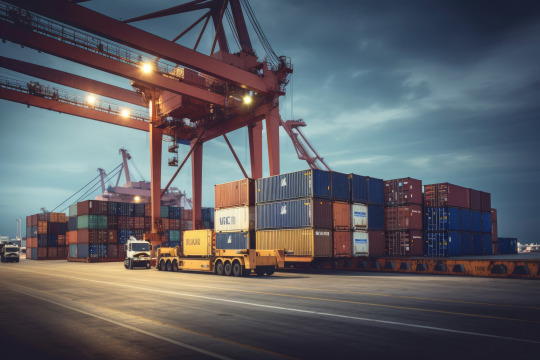
#LogisticsExcellence#EfficientShipping#SupplyChainSolutions#LogisticsPartner#TransportationExperts#WarehousingSolutions#ShippingLogistics#EfficientSupplyChain#LogisticsInnovation#SupplyChainManagement#LogisticsEfficiency
0 notes
Text
Charting the Growth Path of the Warehouse Robotics Market: Robotic Logistics Revolution
The global warehouse robotics market size is anticipated to reach USD 17.29 billion by 2030, exhibiting a CAGR of 19.6% over the forecast period, according to a new report published by Grand View Research, Inc. The expansion of the e-commerce industry, rising labor costs, and the need for greater efficiency and accuracy in warehouse operations fuel the growth of the market.
The e-commerce sector is witnessing remarkable growth due to technological advancements. Technologies like Virtual Reality (VR), Augmented Reality (AR), blockchain technology, Machine Learning (ML), and Artificial Intelligence (AI) are enhancing the shopping experience. Thus, companies seek new methods to enhance operations and logistics while reducing delivery time and costs.
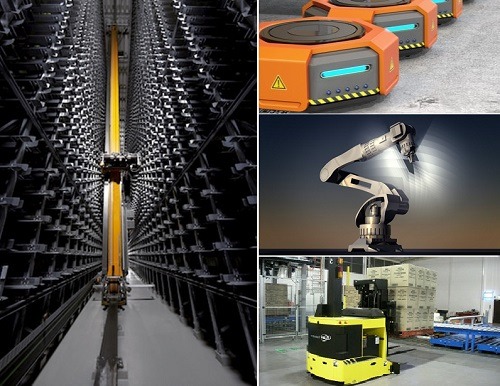
Warehouse Robotics Market Report Highlights
The cartesian robots are expected to witness a CAGR of approximately 20% in the product segment from 2023 to 2030. The factors such as accuracy, precision, and ability to handle heavy loads is expected to fuel the growth
In terms of function, the transportation segment is anticipated to grow at the fastest CAGR of 20.4% over the forecast period. The growth is attributed to increased demand for sorting, loading, and unloading goods from robots
The 11 kg to 80 kg warehouse robots is likely to witness a CAGR of approximately 20% from 2023 to 2030. The ability to efficiently handle medium and heavy-weight items in manufacturing, healthcare, food, beverages, and other industries is expected to support the growth
The software segment is estimated to experience a CAGR of approximately 21% over the forecast period. The segment is divided into a warehouse management system, a warehouse control system, and a warehouse execution system
The healthcare industry is anticipated to witness the fastest CAGR of approximately 21% in the application segment from 2023 to 2030. The growth is attributed to the continuous developments and increased implementation of robots in the healthcare sector to perform a variety of tasks in healthcare warehouses
For More Details or Sample Copy please visit link @: Warehouse Robotics Market Report
Robots offer a smart, cost-efficient alternative to human labor by automating warehouses catering to the increasing need of the e-commerce sector. The robots help companies to maintain employee safety standards and enhance production quality by performing various tasks such as handling the incoming consignment, picking, packing, slotting, shipping, and asset tracking by saving considerable time and effort.
The COVID-19 pandemic impacted the warehouse robotics industry substantially in terms of the demand for robotics and the supply chain of the robotics industry. However, the need for efficient and contactless order fulfillment and labor shortage due to lockdowns fueled the demand for robots and other automation tools in business operations. The market has shown rising demand and continuously growing as companies invest heavily in research and development activities to improve existing technologies and launch advanced robots.
The initial investment of the robotic set-up into the warehouse is high, creating significant challenges for small and mid-sized companies. Furthermore, implementing robots in warehouse operations is affecting labor jobs. The rising adoption of robots is expected to affect employment and wages, affecting the further growth of the warehouse robotics industry over the forecast period.
#WarehouseRobotics#LogisticsAutomation#RoboticWarehousing#SupplyChainTech#AutomationSolutions#SmartWarehouses#RoboticsInLogistics#Industry40#TechInnovation#EfficientSupplyChain#LogisticsTechnology#RoboticsIntegration#AutomatedStorage#DigitalTransformation#InnovativeLogistics#WarehouseEfficiency#AutonomousWarehousing#RoboticsIndustry#TechInvestment#FutureofLogistics
0 notes
Text
3PL Logistics Company In Mumbai JAL Supply Chain, your 3PL logistics choice in Mumbai, combines reliability, expertise, and innovation. Benefit from our industry experience, ensuring precise logistics handling. Our tailored solutions recognize your business uniqueness, offering personalized efficiency. As your business grows, our scalable services provide the flexibility and agility required for seamless supply chain management. Choose JAL Supply Chain for a logistics partner that exceeds expectations, delivering a personalized, scalable, and expertly crafted solution.
#JALSupplyChain#MumbaiLogistics#3PLExcellence#CustomizedSolutions#ScalableLogistics#ReliablePartner#LogisticsInnovation#BusinessGrowth#EfficientSupplyChain#JALLogistics
0 notes
Text

SIMPLIFY The Shipping Process 📦⚓
& INCREASE Logistical Efficiency 📈🚛
For more queries please visit below link 👇🌐 https://www.fresatechnologies.com/products/fresa-gold
For further inquiries, please contact us :📧 [email protected]
#Fresa |#Freightsolutions |#Freightforwarding |#FresaGold |#ERPSoftware |#G2Awards |#bestERPsoftware |#UsersLoveUs |#bestfreightsoftware |#freightforwardingsoftware |#EMEASummer2024 |#LeaderSummer2024 |#fresasoftware |#MomentumLeader |#CategoryLeader |#BestSupport |#Crozdesk |#SimplifyShipping |#LogisticsEfficiency |#StreamlinedShipping |#EfficientLogistics |#ShippingMadeEasy |#OptimizeLogistics |#SmoothShipping |#LogisticsSuccess |#SmartLogistics |#SeamlessShipping |#EfficientSupplyChain |#LogisticsOptimization |#FasterFreight
0 notes
Text
Discover the power of innovation and cost-effectiveness with our cutting-edge logistics solutions.

Discover the power of innovation and cost-effectiveness with our cutting-edge logistics solutions. Unlock efficiency and savings like never before.
#InnovationInLogistics #CostEffectiveSolutions #EfficientShipping #LogisticsTechnology #InnovativeSolutions #SupplyChainSolutions #LogisticsManagement #SmartShipping #AffordableLogistics #SustainableShipping #CostSavingIdeas #CreativeLogistics #InnovateToDeliver #LogisticsEfficiency #ValueDrivenSolutions #EconomicShipping #InnovativeThinking #CostCuttingStrategies #InnovativeLogistics #EfficientSupplyChain
0 notes
Text
How does transport logistics work?
Transport logistics, often referred to simply as logistics, is a crucial component of modern supply chain management. It involves the planning, implementation, and coordination of various processes and activities to ensure the efficient movement of goods and materials from their point of origin to their destination. In this text, we will delve into how transport logistics works and its significance in today's global economy. At its core, transport logistics revolves around optimizing the movement of goods to minimize costs and delivery times while maximizing customer satisfaction. The process begins with the careful planning of routes, modes of transportation, and distribution networks. Factors such as distance, transportation costs, delivery deadlines, and the nature of the cargo all play a role in determining the most suitable transportation method, whether it's road, rail, sea, or air. #LogisticsExcellence #EfficientSupplyChains #GlobalTransportation
0 notes
Text
Third-Party Logistics in UK | The Central prep UK
The Central Prep UK offers third-party logistics (3PL) services in the UK. We help businesses of all sizes with their warehousing, distribution, and transportation needs. We have a team of experienced professionals who are dedicated to providing our clients with the best possible service. For more details visit our site:
#TheCentralPrepUK #LogisticsSolutionsUK #EfficientWarehousing #SeamlessDistribution #ReliableTransportation #SupplyChainExcellence #UKLogisticsServices #StreamlinedOperations #CustomerSatisfaction #WarehousingAndDistribution #EfficientLogistics #LogisticsPartner #Expert3PLServices #EfficientSupplyChain #LogisticsSolutions
0 notes
Text
Benefits of Having an Additional Place of Business in GST

Unlock the advantages of adding an additional place of business in GST. SetupFilings offers expert insights on compliance, efficiency, and growth opportunities.
For more detail read our article - https://setupfilings.com/learn/benefit-of-additional-place-of-business-in-gst-registration/
AdditionalPlaceofBusiness #GSTCompliance #BusinessExpansion #TaxAdvantages #IncreasedMarketReach #OperationalFlexibility #Diversification #BusinessGrowth #WiderCustomerBase #EfficientSupplyChain #EnhancedCompetitiveness #OpportunityForExpansion #GSTBenefits
0 notes
Text
MyHub” Warehouses for Rent: Meet Your Business Needs with Flexible Solutions
Success in the quickly changing corporate environment of today requires both flexibility and scalability. It’s critical for companies in need of warehouse space to choose a solution that can grow with their needs. Let me introduce you to “MyHub” Warehouses for Rent, a cutting-edge service that provides adaptable warehouse solutions made to satisfy the various needs of companies of all kinds. “MyHub” Warehouses are aware that when it comes to warehouse space, one size does not fit all. “MyHub” Warehouses may accommodate every type of business, from startups seeking a little storage space to huge corporations needing significant distribution space. Businesses don’t have to sacrifice functionality or size because a broad variety of warehouse sizes and layouts allow them to select the exact space they need.
“MyHub” Warehouses are unique because of their dedication to customization. In contrast to conventional leasing contracts that bind companies to lengthy terms with little opportunity for modification, “MyHub” provides lease terms that are flexible, enabling companies to grow or shrink their space as needed. Whether it’s a long-term expansion strategy, a seasonal demand swing, or a short-term project, “MyHub” offers the adaptability to turn business realities into opportunities.
Additionally, “MyHub” Warehouses place in Hyderabad a high value on accessibility and convenience. Their warehouses, which are ideally situated in important business districts, provide quick access to main thoroughfares, reducing transportation expenses and enhancing supply chain effectiveness.
To sum up, “MyHub” Warehouses for Rent in Hyderabad present a revolutionary approach for companies looking to lease warehouse space. “MyHub” enables businesses with their adaptable leasing terms, varied selection of space alternatives, and handy locations.
#MyHubWarehouses#FlexibleWarehousing#BusinessStorage#AdaptableSpace#WarehousesForRent#DynamicSolutions#BusinessFlexibility#CustomizableLease#StorageSolutions#BusinessExpansion#LogisticsEase#EfficientSupplyChain#BusinessHub#FlexibleLease#TailoredSpace#WarehousingNeeds#ScalableSolutions#AdaptiveWarehousing#ConvenientLocations#AgileBusiness
0 notes
Text
Unlocking the Potential of Blockchain Technology in Supply Chain Management
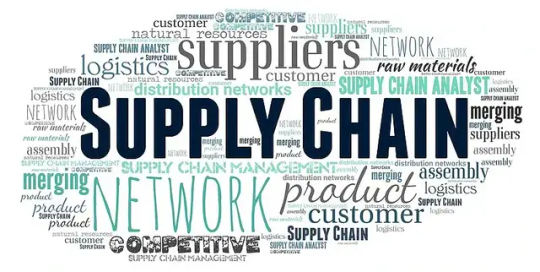
As businesses continue to expand globally, the need for efficient and transparent supply chain management has become more critical than ever. Traditional methods of tracking goods, inventory, and transactions are often cumbersome, prone to errors, and lack transparency. Fortunately, the advent of blockchain technology is revolutionizing how supply chains operate. By leveraging blockchain's decentralized ledger system, companies can now create a more streamlined and secure supply chain that promises to reduce costs while increasing efficiency. Please read on to find out how blockchain technology is transforming the world of supply chain management. From improving transparency in production processes to streamlining logistics and enhancing traceability across the entire supply chain network – we will examine the key benefits that blockchain technology brings to this vital industry.

Supply chain training center. Photo by NAVSUP Business Systems Center. Flickr.
Current Challenges in Supply Chain Management
Supply chain management faces several complex challenges in today's interconnected and post pandemic global market. Traditional solutions, such as manual tracking, spreadsheets, and legacy systems, are no longer efficient enough to handle the speed and complexity of modern supply chains. Let's take a closer look at the problems associated with these traditional solutions and how they impact supply chain management. 1. Inefficiency and Lack of Visibility Traditional supply chain management often relies on manual processes and paper-based documentation. This manual tracking method is time-consuming and prone to errors. Without real-time visibility into the movement of goods and inventory levels, supply chain managers struggle to make informed decisions and respond quickly to changes in demand or disruptions in the supply chain. Also, legacy systems and disparate software applications used for supply chain management can lead to data silos and poor integration. This lack of visibility across different stages of the supply chain hinders collaboration and coordination, making it difficult to optimize operations and meet customer expectations. 2. Complex and Fragmented Networks Modern supply chains involve numerous stakeholders, including suppliers, manufacturers, distributors, retailers, and logistics providers. Traditional solutions often struggle to effectively manage the complex and fragmented nature of these networks. Coordinating activities, sharing information, and ensuring seamless communication among all parties involved becomes a challenging task. Furthermore, the lack of standardized processes and data formats across different organizations within the supply chain can create compatibility issues and inefficiencies. This fragmentation hampers the ability to track and trace products, leading to delays, errors, and a higher risk of counterfeit or non-compliant goods entering the supply chain. 3. Risk and Security Concerns Traditional supply chain management solutions are susceptible to various risks, including fraud, counterfeiting, theft, and data breaches. The centralized control mechanisms employed by these solutions can be vulnerable to manipulation or unauthorized access, compromising the integrity and security of the supply chain. Moreover, the lack of transparency in traditional supply chain management creates opportunities for unethical practices and corruption. Without a reliable and verifiable system to track and authenticate the origin, quality, and movement of goods, it becomes challenging to identify and mitigate risks effectively.

Fintech-blue Block Chain Illustration. Photo by Monito. Flickr.
Exploring the Potential of Blockchain Technology
Blockchain technology offers a promising solution to address the challenges faced by traditional supply chain management. With its decentralized and transparent nature, blockchain can transform the way supply chains operate by providing enhanced visibility, efficiency, and security. By leveraging blockchain's distributed ledger system, supply chain managers can track goods from their origin through each step of the journey in real-time. The decentralized nature of blockchain eliminates the need for intermediaries, reducing costs and increasing the speed of transactions. Additionally, every transaction recorded on the blockchain is immutable, ensuring transparency and accountability throughout the supply chain. Blockchain technology enables the implementation of smart contracts, which are self-executing agreements that automatically trigger predefined actions based on predefined conditions. Smart contracts streamline processes, automate payments, and enhance trust among stakeholders. Moreover, blockchain's cryptographic algorithms and consensus mechanisms ensure the security and integrity of data within the supply chain. The decentralized nature of the ledger eliminates the risks associated with centralized control, reducing the potential for fraud, manipulation, and unauthorized access.
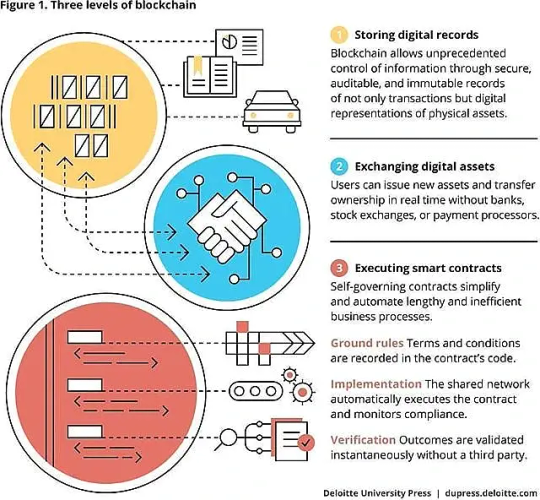
The three levels of Blockchain. Photo by Paula Piccard. Flickr.
What is Blockchain Technology?
Blockchain technology has become increasingly popular in recent years, but what exactly is it and how does it work? At its core, blockchain is a distributed ledger system that allows for secure and transparent record-keeping. This means that instead of relying on a central authority to verify transactions, blockchain uses a network of computers to maintain a shared database that can be accessed by anyone. One of the key advantages of blockchain technology is its ability to provide transparency and security. Because each transaction is verified by multiple nodes in the network, it becomes very difficult for any one person or entity to manipulate the data. This makes it an ideal solution for industries such as finance and healthcare where trust and accuracy are paramount. Also, because the ledger is distributed across many different nodes, there’s no single point of failure which further enhances its security. Overall, blockchain technology offers numerous benefits over traditional record-keeping systems.

Blockchain Technology Helping Packagers Improve the Supply Chain. Photo by Assemblies Unlimited, Inc. Flickr.
Benefits of Blockchain for Supply Chain Management
Blockchain technology has become a game-changer in the world of supply chain management due to its ability to enhance transparency, efficiency, and security. Traditionally, supply chain management has been characterized by various challenges such as lack of visibility into the movement of goods, delays in payment reconciliation, and susceptibility to fraud. However, blockchain technology offers a revolutionary solution by providing a decentralized system that enables secure storage and sharing of data across multiple parties. One significant benefit that blockchain brings to supply chain management is increased transparency. Transparency is vital for enhancing trust between different parties involved in the supply chain. With blockchain technology, every transaction is recorded on an immutable ledger that cannot be altered without consensus from all parties involved. This feature enables stakeholders to track their products' progress from one stage to another and locate any bottlenecks or potential weaknesses in the process easily.
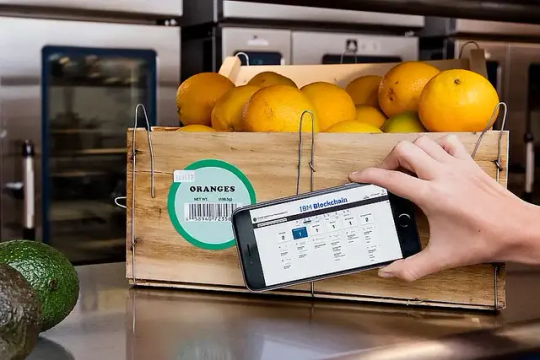
IBM Blockchain addresses global food security from the hands of leading companies in food and distribution. Photo by IBM España. Flickr.
Real-world Applications of Blockchain in Supply Chain Management
Blockchain technology is rapidly gaining popularity as a tool for enhancing supply chain management and increasing transparency. Blockchain, which was initially developed for digital currencies like Bitcoin, has found its way into various industries, providing an immutable record of transactions that can be easily verified by parties involved in the supply chain process. The result is increased trust and efficiency in the supply chain. One industry that has embraced blockchain technology is the food industry. Walmart uses blockchain to track the origin of produce from farm to store shelves. This ensures that customers have access to fresh food while reducing waste and improving efficiency along the supply chain. Another industry using blockchain technology is finance, where banks use it to reduce fraud and transaction time during interbank transfers. The pharmaceutical industry has also adopted blockchain to improve transparency in drug distribution channels. Blockchain records can help prevent counterfeit drugs from entering legitimate markets, ensuring patient safety. Table: Comparison of Traditional Supply Chain Management and Blockchain Technology Aspects Traditional Supply Chain Management Blockchain Technology Transparency Limited visibility into the supply chain Real-time visibility and traceability of every transaction and product movement Efficiency Manual processes and paperwork Automated processes through smart contracts, reducing errors and delays Security Data vulnerabilities and potential for fraud Immutable records and cryptographic security, reducing the risk of fraud and counterfeiting Trust Reliance on intermediaries and information asymmetry Decentralized network and consensus mechanisms, fostering trust among participants
Conclusion
In conclusion, blockchain technology is revolutionizing the way supply chains operate. By providing transparency, security, and efficiency, it is changing the game for businesses across the globe. From reducing fraud and errors to increasing trust among stakeholders, blockchain is a powerful tool that can help organizations stay competitive in today's fast-paced economy. As more and more industries adopt this technology, we can expect to see even greater benefits in terms of cost savings, improved customer experiences, and streamlined operations. Whether you're working in logistics, manufacturing, or retail, it's time to start exploring how blockchain can help you transform your supply chain management processes. Sources: THX News & Researchgate. Read the full article
#Benefitsofblockchaininsupplychain#Blockchaintechnology#Complexsupplychainnetworks#Efficientsupplychain#Inefficiencyinsupplychain#Riskandsecurityinsupplychain#Supplychainmanagement#Supplychainvisibility#Traditionalsolutions#Transparentsupplychain
0 notes